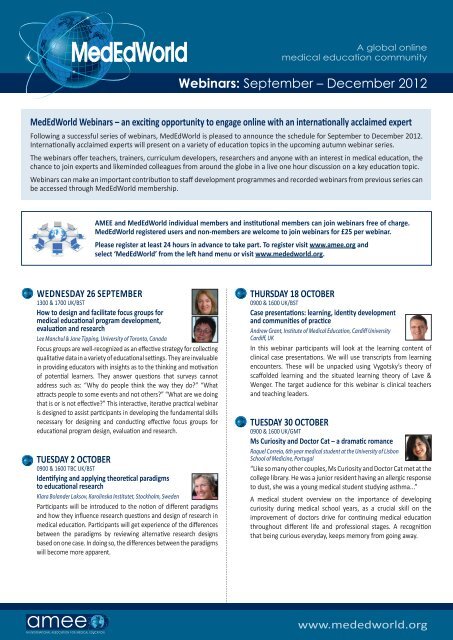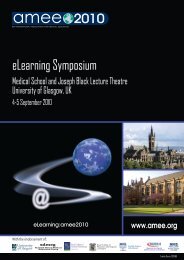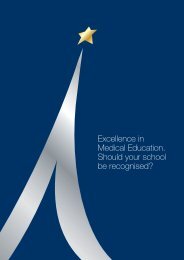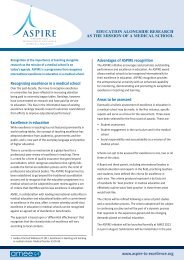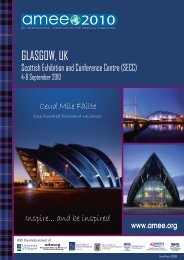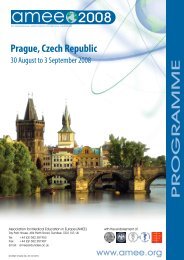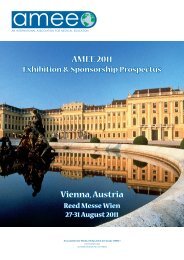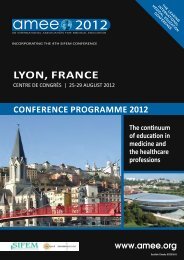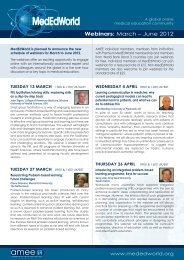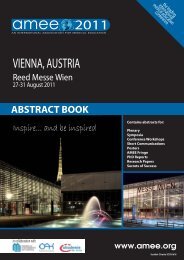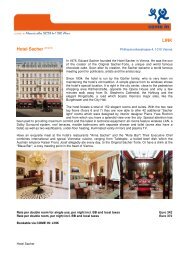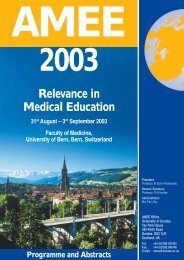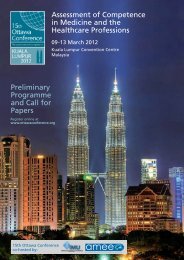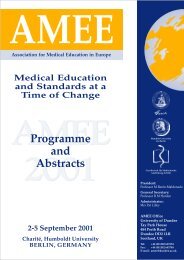Webinars - AMEE
Webinars - AMEE
Webinars - AMEE
You also want an ePaper? Increase the reach of your titles
YUMPU automatically turns print PDFs into web optimized ePapers that Google loves.
MedEdWorld<br />
MedEdWorld <strong>Webinars</strong> – an exciting opportunity to engage online with an internationally acclaimed expert<br />
Following a successful series of webinars, MedEdWorld is pleased to announce the schedule for September to December 2012.<br />
Internationally acclaimed experts will present on a variety of education topics in the upcoming autumn webinar series.<br />
The webinars offer teachers, trainers, curriculum developers, researchers and anyone with an interest in medical education, the<br />
chance to join experts and likeminded colleagues from around the globe in a live one hour discussion on a key education topic.<br />
<strong>Webinars</strong> can make an important contribution to staff development programmes and recorded webinars from previous series can<br />
be accessed through MedEdWorld membership.<br />
<strong>AMEE</strong> and MedEdWorld individual members and institutional members can join webinars free of charge.<br />
MedEdWorld registered users and non-members are welcome to join webinars for £25 per webinar.<br />
Please register at least 24 hours in advance to take part. To register visit www.amee.org and<br />
select ‘MedEdWorld’ from the left hand menu or visit www.mededworld.org.<br />
WEDnEsDAy 26 sEPTEMbEr<br />
1300 & 1700 UK/BST<br />
How to design and facilitate focus groups for<br />
medical educational program development,<br />
evaluation and research<br />
Lee Manchul & Jane Tipping, University of Toronto, Canada<br />
Focus groups are well-recognized as an effective strategy for collecting<br />
qualitative data in a variety of educational settings. They are invaluable<br />
in providing educators with insights as to the thinking and motivation<br />
of potential learners. They answer questions that surveys cannot<br />
address such as: “Why do people think the way they do?” “What<br />
attracts people to some events and not others?” “What are we doing<br />
that is or is not effective?” This interactive, iterative practical webinar<br />
is designed to assist participants in developing the fundamental skills<br />
necessary for designing and conducting effective focus groups for<br />
educational program design, evaluation and research.<br />
TUEsDAy 2 OCTObEr<br />
0900 & 1600 TBC UK/BST<br />
Identifying and applying theoretical paradigms<br />
to educational research<br />
Klara Bolander Laksov, Karolinska Institutet, Stockholm, Sweden<br />
Participants will be introduced to the notion of different paradigms<br />
and how they influence research questions and design of research in<br />
medical education. Participants will get experience of the differences<br />
between the paradigms by reviewing alternative research designs<br />
based on one case. In doing so, the differences between the paradigms<br />
will become more apparent.<br />
A global online<br />
medical education community<br />
<strong>Webinars</strong>: September – December 2012<br />
THURSDAY 18 OCTOBER<br />
0900 & 1600 UK/BST<br />
Case presentations: learning, identity development<br />
and communities of practice<br />
Andrew Grant, Institute of Medical Education, Cardiff University<br />
Cardiff, UK<br />
In this webinar participants will look at the learning content of<br />
clinical case presentations. We will use transcripts from learning<br />
encounters. These will be unpacked using Vygotsky’s theory of<br />
scaffolded learning and the situated learning theory of Lave &<br />
Wenger. The target audience for this webinar is clinical teachers<br />
and teaching leaders.<br />
TUESDAY 30 OCTOBER<br />
0900 & 1600 UK/GMT<br />
Ms Curiosity and Doctor Cat – a dramatic romance<br />
Raquel Correia, 6th year medical student at the University of Lisbon<br />
School of Medicine, Portugal<br />
“Like so many other couples, Ms Curiosity and Doctor Cat met at the<br />
college library. He was a junior resident having an allergic response<br />
to dust, she was a young medical student studying asthma...”<br />
A medical student overview on the importance of developing<br />
curiosity during medical school years, as a crucial skill on the<br />
improvement of doctors drive for continuing medical education<br />
throughout different life and professional stages. A recognition<br />
that being curious everyday, keeps memory from going away.<br />
www.mededworld.org
nOVEMbEr (date to be confirmed)<br />
Using theory in medical education research<br />
Renée Stalmeijer Maastricht University, Netherlands<br />
This webinar will introduce participants to sociological, educational<br />
psycho-logical and socio-cultural theories relevant to medical<br />
education research and demonstrate how they can be used in<br />
designing research. The webinar is aimed at participants who<br />
are planning to do research in the field of medical education,<br />
but have little or no experience with conducting research in the<br />
field. This webinar is especially recommended to RESME course<br />
participants.<br />
TUEsDAy 20 nOVEMbEr<br />
1300 & 1700 UK/GMT<br />
An introduction to generalizability theory and its<br />
application to common medical education problems<br />
André F De Champlain, Medical Council of Canada, Canada<br />
Reliability is a key psychometric property that needs to be assessed<br />
with all examinations. That is, to what extent are my test scores<br />
reproducible or consistent across situations e.g., across time?<br />
Performance assessments pose additional challenges in that<br />
multiple sources of variance can contribute measurement error and<br />
detract from the reliability of scores or decisions. Generalizability<br />
theory provides a useful framework to partition these sources of<br />
error and properly estimate reliability<br />
The aim of this webinar is to provide an overview of generalizability<br />
theory models and related key concepts. This webinar will be<br />
supplemented with several illustrative practical examples.<br />
TUEsDAy 27 nOVEMbEr<br />
1700 UK/GMT<br />
science in Medical Education: More than<br />
transmitting facts!<br />
Aviad Haramati, Georgetown University School of Medicine, USA<br />
With the discovery of new scientific information increasing<br />
exponentially each year, medical science educators are faced with the<br />
challenge of determining how best to educate students in the health<br />
professions in science and how the learning can progress throughout<br />
the continuum of medical education. In this webinar, Dr Haramati<br />
will share his perspectives on what the competencies and outcomes<br />
regarding science should be and how to improve the learning of<br />
science by creating an appropriate climate that encourages inquiry<br />
and curiosity. He will also advocate a new role for faculty who teach<br />
science, which is to participate in the professional development of<br />
students through educational interventions that improve professional<br />
behaviours.<br />
For more information on becoming part of the MedEdWorld<br />
Community visit www.mededworld.org/Join.aspx<br />
MedEdWorld individual membership is a benefit of <strong>AMEE</strong><br />
membership. Alternatively you can join MedEdWorld as an<br />
individual member for an annual membership fee of £25 at<br />
www.mededworld.org.<br />
THUrsDAy 6 DECEMbEr<br />
1400 & 1700 UK/GMT<br />
The small Group Experience: strategies to improve<br />
your performance as facilitator<br />
Carol F Capello & Joseph Murray Weill Cornell Medical College,<br />
New York, USA<br />
This reflective webinar will discuss practical approaches to<br />
managing various types of small groups in the medical education<br />
curriculum. Educators will gain confidence in dealing with stresses<br />
particular to this teaching modality after learning strategies for<br />
assessing group dynamics, addressing problematic behaviours,<br />
anticipating a group’s stages of development to help the group<br />
perform effectively, and giving formative feedback on longitudinal<br />
assessment.<br />
WEDnEsDAy 12 DECEMbEr<br />
1300 & 1600 UK/GMT<br />
Effective use of E-portfolios in faculty development<br />
programs<br />
Abbas Ghavam-Rassoul, Shirley Lee, and Helen Batty, Department<br />
of Family and Community Medicine, University of Toronto, Canada<br />
Portfolio use and supporting reflections of learners<br />
is a challenging undertaking in health practitioner<br />
education. Participants will leave this session with<br />
an understanding of the strengths and weaknesses of different<br />
electronic platforms, the utility of reflection support meetings and<br />
the use of guidelines for assessment of portfolios.<br />
Spring 2013 webinar series<br />
Scheduled webinars are noted below. Others will be added in the final<br />
programme to be published December 2012.<br />
TUEsDAy 12 MArCH 1300 & 1700 UK/GMT<br />
21st Century Curriculum Planning: Fostering Expertise through<br />
Experiential Learning and Feedback<br />
Sharon Krackov, New York, USA and Henry Pohl, Albany Medical College, USA<br />
THUrsDAy 28 MArCH (provisional) 1300 & 1700 UK/GMT<br />
Transform your Classroom into Active Learning: Team-based<br />
Learning from A-Z<br />
Dean Parmelee, Wright State University Boonshoft, School of Medicine, USA<br />
WEDnEsDAy 10 APrIL 1600 UK/BST<br />
An Introduction to Competency-based Outcomes Education<br />
Jason R Frank, Royal College of Physicians and Surgeons of Canada, University of<br />
Ottawa, Canada<br />
THUrsDAy 24 APrIL (provisional) 1300 & 1700 UK/BST<br />
Effective Faculty Leadership in Organisational Change<br />
Elza Mylona, Stony Brook University School of Medicine, USA<br />
DATEs AnD TIMEs TO bE COnFIrMED<br />
Measurement and Improvement of the OsCE: recognition and<br />
remediation of station Level Problems. Mini-series of two<br />
webinars drawn from <strong>AMEE</strong> pre-conference workshop.<br />
Richard Fuller and Godfrey Pell, School of Medicine University of Leeds, UK<br />
Details are available at:<br />
www.mededworld.org/<strong>Webinars</strong>/Upcoming-<strong>Webinars</strong>.aspx<br />
Scottish Charity: SC031618<br />
MedEdWorld, Tay Park House, 484 Perth Road, Dundee DD2 1LR, UK<br />
Tel: +44 (0)1382 381959 Fax: +44 (0)1382 381987 Email: admin@mededworld.org www.mededworld.org


